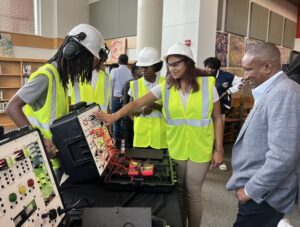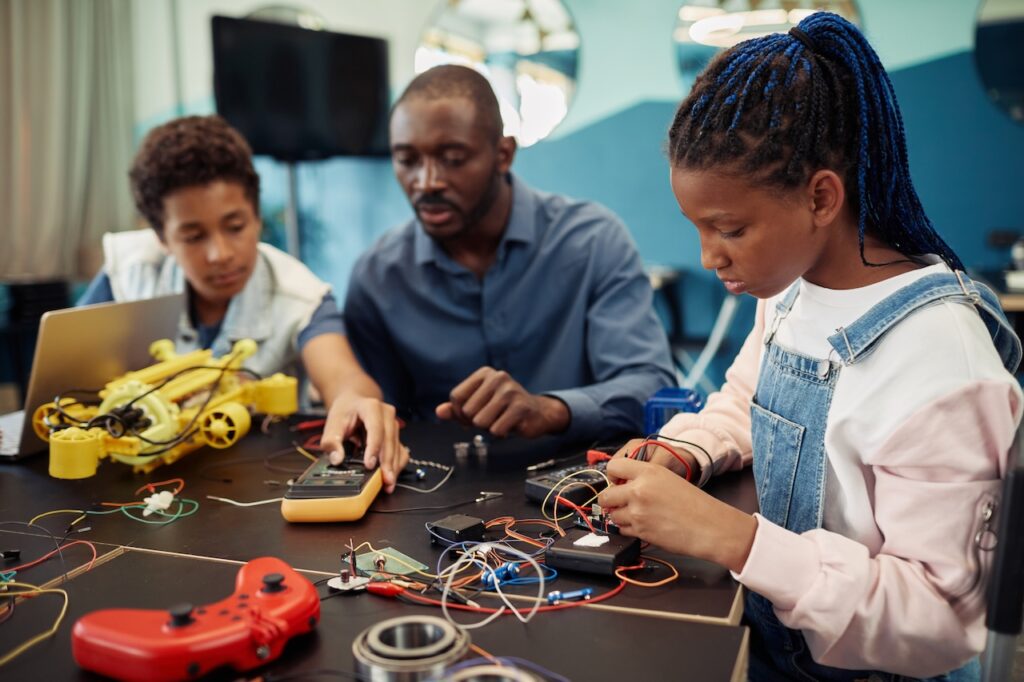HELPING
STEM SUCCESS
GROW
Educate Texas brings private funders and school districts together to enable a unified vision for pre-K through 12th grade STEM education. The shared goals include strengthening instruction and academics, building relationships with business and industry, preparing students for STEM careers, and scaling successes.
Lancaster ISD has become a statewide model for districtwide STEM transformation.
With long-standing support from Educate Texas and the Texas Instruments Foundation, the district has embedded rigorous, real-world STEM learning into every campus—improving student outcomes, empowering educators, and building a foundation for long-term community impact.
Lancaster ISD’s districtwide STEM initiative is designed to:
Redesign instruction through problem-based learning that emphasizes creativity, collaboration, and real-world problem solving across all grade levels.
Invest in educator talent by supporting graduate-level STEM credentials, instructional coaching, and leadership development aligned to STEM goals.
Expand student access to dual credit, early college pathways, and hands-on STEM experiences that connect learning to future careers.
Strengthen partnerships with higher education institutions and local industries to align curriculum with workforce needs and open new opportunities for students.
Create a scalable model for STEM implementation that informs and inspires other districts across Texas.
Lancaster’s bold approach to STEM education has yielded strong outcomes at every level.
Academic Growth: Student performance on state math assessments increased by more than 300% between 2012 and 2017, with sustained growth in science as well.
Educator Development: The number of teachers holding advanced degrees nearly doubled, and Lancaster ISD now exceeds the state average in this category by 10 percentage points.
College and Career Readiness: Since 2021, more than 120 students have graduated with associate degrees. Dual credit and early college participation have continued to expand.
Student Recognition: Students have received prestigious accolades, including acceptance to competitive postsecondary programs and top honors in national STEM competitions.
Model for Innovation: Lancaster ISD has hosted more than 50 learning tours and received statewide recognition for its districtwide STEM approach, including the H-E-B Excellence in Education Award.
 🔗 Empowering Futures: Transformative STEM Education for Southern Dallas County
🔗 Empowering Futures: Transformative STEM Education for Southern Dallas County
This feature explores how Lancaster ISD built a districtwide STEM model rooted in equity, engagement, and innovation. Through intentional partnerships, hands-on learning, and a commitment to student voice, the district has created pathways that equip students for evolving college and career opportunities.
More stories coming soon.
DeSoto ISD is embedding STEM education into a broader district vision that prioritizes student achievement, innovation, and readiness for the future.
Through the Triple A Experience and a focused partnership with Educate Texas and the Texas Instruments Foundation, the district is aligning its academic strategy, workforce pathways, and community partnerships to expand opportunity and outcomes across its schools.
With STEM at the center of its academic strategy, DeSoto ISD is focused on:
Embedding STEM and project-based learning across all grade levels through integrated instructional strategies and classroom coaching.
Improving math and science instruction with high-quality materials, in-class support, and targeted interventions for students and educators.
Expanding postsecondary access through dual credit, industry-based certifications, and a TEA-designated P-TECH Early College program.
Building student interest and confidence in STEM through hands-on learning, real-world connections, and extracurricular opportunities.
Engaging families and community partners to strengthen career awareness, mentoring, and support for STEM pathways.
Developing teacher and leader capacity via PLCs, aligned district goals, and increased access to professional development and coaching.
DeSoto ISD’s focused efforts are showing encouraging growth in academic performance, career readiness, and student engagement.
CTE Certification Growth: Students earning industry-based certifications more than tripled from 129 to 469 in one year. Certification programs now span multiple high-demand fields.
Academic Gains: 57% of 5th and 8th graders met or exceeded STAAR math growth targets in 2022–23—up from 25% and 24%, respectively, the year prior. Science growth also improved in 5th grade, from 19% to 27%.
Algebra I Access: The percentage of 8th-grade students earning Algebra I credit rebounded to pre-pandemic levels at 18%.
Postsecondary Readiness: Since 2018, more than 350 students have graduated with associate degrees. In 2024, DeSoto ISD received a P-TECH designation to launch new early college pathways in nursing and automotive technology.
STEM Mindset Growth: In 2023–24, 75% of students reported confidence in succeeding in science and math, up from 48% the year before. More than 60% of students participated in STEM-related field trips and said they knew who to ask about career opportunities.
Community Partnership Momentum: All surveyed partners expressed a desire to remain involved, with career exposure, mentoring, and classroom engagement cited as high-impact strategies for student success.
More stories from DeSoto ISD’s STEM journey coming soon.
Cedar Hill ISD is redefining what STEM means at the district level—placing real-world learning, student voice, and community partnerships at the heart of education.
Through its STEMspired initiative, supported by Educate Texas and the Texas Instruments Foundation, the district is building sustainable systems to prepare students for college, career, and life.
Cedar Hill ISD is working to:
Integrate project-based learning across classrooms to foster deeper engagement, critical thinking, and real-world problem solving.
Build clear college and career pathways through increased access to dual credit, industry certifications, and labor market-aligned programming.
Improve Tier 1 instruction by supporting teacher development and aligning professional learning with districtwide STEM priorities.
Use data to inform instruction and refine supports that help all students meet academic and growth benchmarks.
Expand student exposure to STEM careers through hands-on experiences, extracurricular programs, and local industry connections.
Strengthen stakeholder engagement by including families, educators, and community partners in shaping and sustaining a unified STEM vision.
Cedar Hill ISD’s investment in STEM education is driving progress in student achievement, career preparation, and instructional alignment.
Academic Growth: STAAR math growth improved significantly between 2021–22 and 2022–23—from 26% to 49% in 5th grade and from 15% to 39% in 8th grade. Science growth in 8th grade doubled over the same period.
MAP Score Gains: In 5th-grade science, 58% of students met MAP growth targets in 2023, up from 28% the year prior. In 8th-grade science, growth increased from 29% to 47%.
CTE Certifications: Of 758 students tested in CTE courses in 2022–23, 441 earned industry-based certifications—a pass rate of nearly 60%.
Associate Degree Completion: More than 460 students graduated with associate degrees between 2018 and 2023—a clear indicator of strengthened college readiness systems.
College Readiness Indicators: SAT benchmarks in math and reading improved across student groups. TSI readiness in reading increased from 10% to 21%, and in math from 21% to 22%, as of 2022–23.
Student Confidence in STEM: 70% of students reported thinking critically to solve problems, and 63% expressed confidence in earning good grades in math and science.
Community Engagement: Partners cited career awareness, student exposure to STEM fields, and professional development as top priorities for long-term collaboration.
More stories from Cedar Hill ISD’s STEMspired journey coming soon.
Denison ISD and Dallas ISD are the latest districts to join a growing network of partners working with Educate Texas and the TI Foundation to advance districtwide STEM.
These efforts build on earlier work with Richardson ISD, whose partnership helped inform implementation strategies now being scaled across North Texas. From rural innovation in Denison to AI-powered teaching tools in Dallas, each district is taking a targeted approach to improve instruction, expand opportunity, and prepare students for the future of STEM.
Across Denison and Dallas ISDs, STEM investments are focused on:
Improving teaching quality and instructional practice with targeted supports such as AI feedback tools, curriculum enhancements, and coaching.
Expanding STEM pathways through advanced coursework, industry-based certifications, and hands-on learning experiences.
Addressing learning gaps in math and science with evidence-based interventions and personalized supports.
Developing educator and leadership capacity through aligned professional development and instructional system design.
Strengthening community partnerships to connect classroom learning with postsecondary and workforce opportunities.
Piloting scalable models that can inform future implementation across districts with diverse needs and contexts.
Each district is pursuing focused goals to strengthen STEM learning and educator support.
Denison ISD is aligning instruction with regional labor market trends and using grant investments to expand CTE offerings, dual credit opportunities, and teacher development.
Dallas ISD is piloting an innovative, AI-based classroom feedback system for middle school math teachers. The technology will provide real-time insights into teaching and student engagement, making it one of the first large-scale implementations of its kind in the country.
Richardson ISD previously partnered with Educate Texas to enhance STEM integration. That early collaboration contributed to the development of coaching models and instructional strategies now used with other districts.
Stories from these North Texas districts are coming soon as implementation continues and early results emerge.

Projections show Texas will be among the top states for STEM job opportunities in the next decade.
With investments from partners like the TI Foundation, Educate Texas is helping school districts deliver high-quality STEM education that connects students to real-world learning and long-term opportunity.